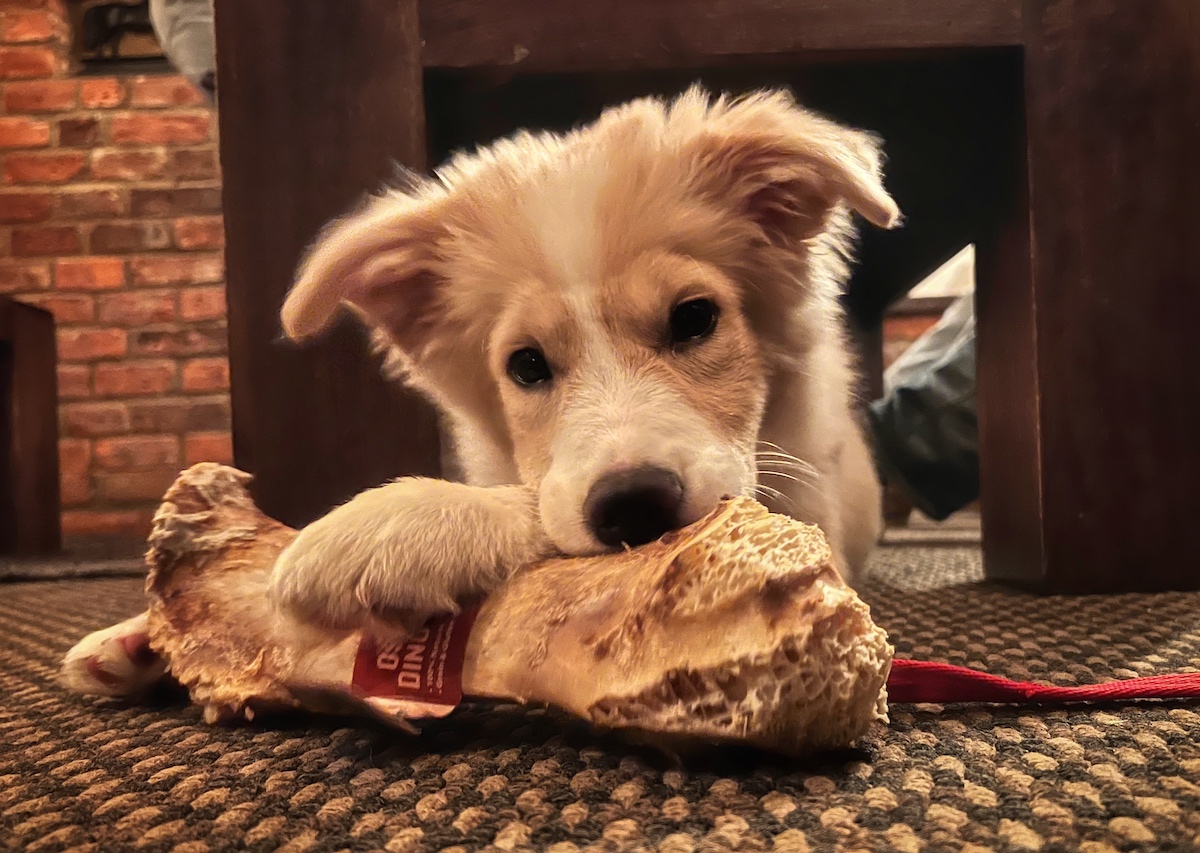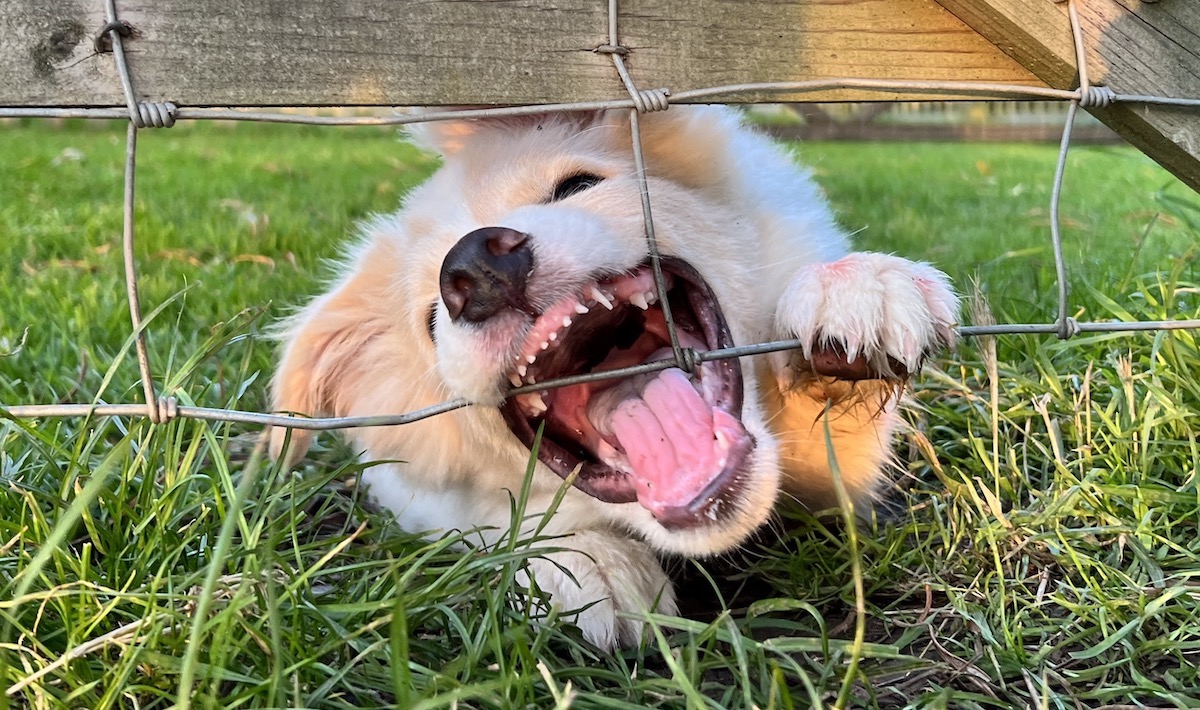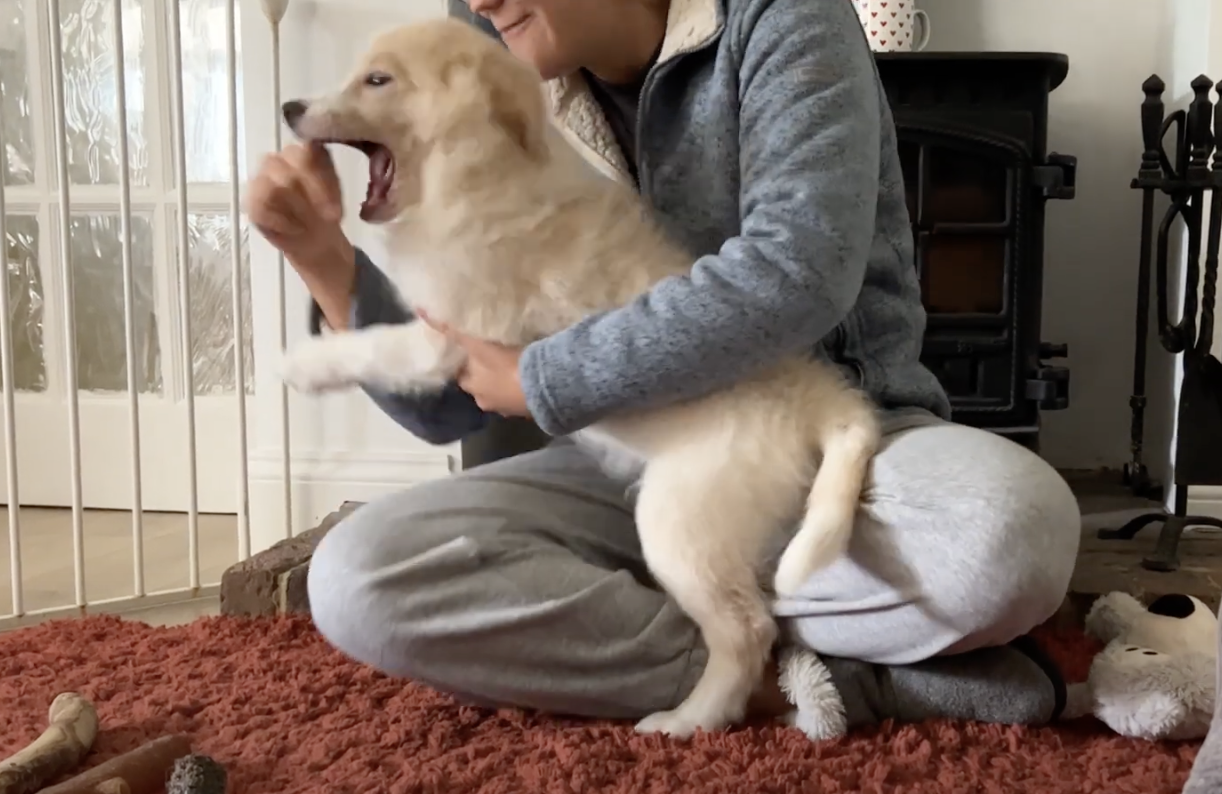Play biting is a really common, very painful issue for many border collie puppy owners. Ozzy is now 14 weeks old and his puppy biting is, at times, especially when he’s tired and needs to sleep, quite painful. One of the most common questions I am asked by puppy owners is “How do I stop my border collie puppy biting”?
In the video above, Ozzy is successfully redirected onto a toy, but it’s not always that easy!
What causes border collie puppy biting?
First of all, it’s important to know that puppy biting is a normal part of puppy behaviour. If our young puppies were still living with their littermates, they would still be playing, and, through play, it’s thought that they learn all sorts of new behaviours that would be helpful for them in the future as adults. These behaviours include knowing how to play with other dogs, how to mate with other dogs, they learn about bite inhibition, which means they learn how hard they can bite, without hurting other dogs, and causing an unpleasant reaction. They learn gross motor skills, such as walking, running, body awareness, jumping, and turning. Play is an important part of puppies’ growing up and studies have shown that puppies who are taken from litters too soon, or who grow up without litter mates or other dogs are less able to understand dog body language or communicate with other dogs later in life. And biting is a crucial part of puppy play. Biting is also a puppy’s way of exploring the world. We have hands, but our puppies can only manipulate objects properly with their mouths.
Therefore, most of our recommendations as behaviourists regarding puppy biting are based on managing the behaviour rather than trying to stop it.
Is your puppy getting enough sleep?
There are some crucial parts to managing border collie puppy biting and probably the most important of these is to ensure that the dog is getting enough sleep. It’s often quoted that puppies of eight weeks of age need approximately 18 to 20 hours of sleep per day. This will decrease slightly as they go through the first couple of months, but you should always aim to be facilitating sleep for your puppy as much as possible. Getting into a good routine is key to this. With Ozzy we have cycles throughout the day consisting of:
- Waking up
- Going out to toilet
- Play (but keeping things very calm no quick hand movements, nice long/slow strokes and having suitable toys/chews for puppies that are potentially teething)
- After each play session, we go out to toilet in the garden
- Dinner
- Toilet in the garden again then very soon after this:
- Sleep
Now that Ozzy has had all his vaccinations and is old enough to go for short walks, we integrate short walks into this routine. These should be very brief – no more than about 10-15 minutes going at his pace, allowing him all the time he needs to stop, sniff and observe things. This is more than enough for a puppy of 16 weeks of age. These walks are really important for building up your puppy’s exposure to the outside world but it needs to be done carefully, and you can find more information about socialisation in this blog post: “Border collie puppy socialistion”,
The video below was recorded specifically to show what border collie biting can look like and it hurts! This type of biting is typical of Ozzy when he is overtired. Usually I would not allow this and would immediately get his lickimat, with a teaspoon of natural yoghurt on it and give him it in his pen. The lickimat and yoghurt is his signal that he is staying in his pen for a sleep, and he always settles down and sleeps.
Does your puppy have plenty of enrichment activities?
The next crucial factor to consider when managing border collie puppy biting is the provision of activities to keep puppies entertained. Natural dog chews, such as those provided by JR Pet Products, are perfect for this, but always check that the chews are suitable for puppies of your pup’s age. Kongs, lickimats, snuffle mats and other treat dispensing toys are also very useful. As well as natural yoghurt or peanut butter, you could mix your puppy’s normal food with hot water and spread the paste on lickimats or inside kongs and then freeze them to make the activity last longer.

Forage boxes are also really good for keeping puppies entertained. These consist of a box big enough for the puppy to climb into, filled with items from household items and items from the recycling bin such as paper, cereal boxes, milk cartons, plastic bottles, any sort of item that is safe for the puppy to investigate, rip open, and destroy. Cut holes in some of these items, big enough for treats to fall out, and put treats inside. Use different types of treats so that the puppy is not bored with finding the same treats all the time. Put treats in the centre of loo rolls and stuff each end with paper, plait old rags of material and hide treats in the plaits, and the same could be done with knots of material. As well as hiding food in the items, scatter tiny bits of food over and under everything. You can include lickimats, snuffle mats and kongs in forage boxes, as well as interesting bits and pieces from walks, such as leaves, pine cones, feathers etc. Be really creative and think of ways of hiding food, novel items and new smells from new places in the forage box that the puppy will enjoy finding while ripping apart old unused packaging. It’s often best to use your puppy’s normal kibble or other food for this activity to avoid upset tummies, which can make the biting worse.
Is your puppy feeling pain or discomfort?
And this is where we come to the final factor to consider when managing puppy biting. And that is to always be mindful that the puppy could be feeling pain or discomfort, because this will usually, if not always, make border collie puppy biting much worse. Very young puppies are often subject to poorly tummies. So if your puppy has diarrhoea or is vomiting or just seems generally off their food for a day or so, always contact your vet for advice. Parasites, including a particularly nasty parasite called giardia, which is becoming much more common in the UK, can cause tummy pain in very young puppies and is quite difficult to get rid of. This could also lead to lasting damage to your puppies gastrointestinal intestinal tract so it’s important to contact your vet if you see any persistent diarrhoea.
Teething is the other main cause of pain or discomfort in very young puppies, and whilst there is little we can do to prevent this, knowing about it allows us to be more sympathetic towards biting puppies and to try to provide them with plenty of chewing opportunities such as toys, chews and other items that are safe for them to chew as this will help to relieve the pain. Freezing toys and chews can help.
Why do collies puppies sometimes seem intent on biting their owners rather than toys or chews?
Owners often ask me why puppies seem determined to bite their owners’ hands, arms, legs, or feet rather than toys or chews.

I believe that this is because puppies have a social need to play with other social beings. We’ve taken them out of their litter environment away from their mother and littermates when, naturally, they would usually still be with them for several months more. It is therefore our responsibility to give puppies that social interaction. However, we do need to teach puppies what is and isn’t acceptable. I always recommend that owners keep a diary for several days noting when their pup’s biting behaviour is worse and then pre-empt biting at these times by giving the puppy an alternative activity. If your puppy starts biting you at any time, try to stand still if you are walking and stay stood still until the puppy has got bored and wandered off. If you are sitting on the floor with your puppy said, try to redirect him onto other toys. If this doesn’t work, it’s very likely that your puppy is overtired so put him in his crate or pen area with a lickimat, or kong, or something else to lick or chew to give him time to calm down. Anything related to sniffing, licking or chewing, will calm collies down very quickly, and will help to calm them down into a more pleasant, calm companion.
Sometimes border collie puppies are so over-aroused that owners are unable to move them into a pen or crate without getting bitten or scratched. In these types of situations, if this starts to happen regularly, I advise owners to use a house line or training line which is a very lightweight training lead of about 3m in length, that the puppy trials behind him at all times during the day (but don’t leave them unsupervised while wearing it). You can buy these relatively cheaply for only £3 at Pets at Home . Then whenever the puppy starts to bite and is becoming very overaroused, don’t say anything. Simply pick up the lead and gently move the puppy into his pen or crate and shut the door and walk away to give him time to calm down. Over time, puppies quite quickly learn that uncontrollable biting does not end favorably and will start to learn to regulate their behaviour.
What not to do to stop your border collie puppy biting
There are certain things that owners often do that makes this type of puppy biting much worse. These include trying to restrain the puppy, telling the puppy off, smacking the puppy, using high-pitched noises (as is often recommended in articles online) and running or trying to get away from the puppy . All of these things will increase the puppy’s frustration and make biting worse with border collie puppies. The best advice I can give you is to always stay calm, and avoid rough-and-tumble play. Keep your hands out of the way. Try to redirect onto an alternative activity and if this doesn’t work, calmly but firmly pick up the long line and put the puppy in his pen or crate to calm down and most probably settle down for a sleep.
If you need any help with your puppy biting, please don’t hesitate to get in touch.

